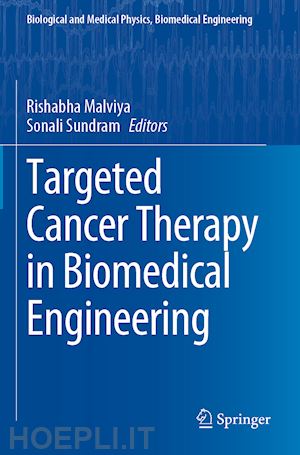

Questo prodotto usufruisce delle SPEDIZIONI GRATIS
selezionando l'opzione Corriere Veloce in fase di ordine.
Pagabile anche con Carta della cultura giovani e del merito, 18App Bonus Cultura e Carta del Docente
This book highlights the role of Biomedical Engineering (BME) used in diagnosis (e.g., body scanners) and treatment (radiation therapy and minimal access surgery in order to prevent various diseases). In recent years, an important progress has been made in the expansion of biomedical microdevices which has a major role in diagnosis and therapy of cancer. When fighting cancer, efficacy and speed are of the utmost importance. A recently developed microfluidic chip has enabled a breakthrough in testing the efficacy of specialized cancer drugs.
Effective cancer-targeting therapies will require both passive and active targeting strategies and a thorough understanding of physiologic barriers to targeted drug delivery. Targeted cancer treatments in development and the new combinatorial approaches show promise for improving targeted anticancer drug delivery and improving treatment outcomes.This book discusses the advancements and innovations in the field of BME that improve the diagnosis and treatment of cancer. This book is focused on bioengineering approaches to improve targeted delivery for cancer therapeutics, which include particles, targeting moieties, and stimuli-responsive drug release mechanisms. This book is a useful resource for students, researchers, and professionals in BME and medicine.
Dr. Rishabha Malviya completed his B. Pharmacy from Uttar Pradesh Technical University and M. Pharmacy (Pharmaceutics) from Gautam Buddha Technical University, Lucknow, Uttar Pradesh. His Ph.D. was in the area of Novel Formulation Development Techniques. He has 11 years of research experience and is currently working as Associate Professor at the Department of Pharmacy, School of Medical and Allied Sciences, Galgotias University. His areas of interest include formulation optimization, nanoformulation, targeted drug delivery, localized drug delivery, and characterization of natural polymers as pharmaceutical excipients.
Prof. Sonali Sundram completed her B. Pharm and M. Pharm (pharmacology) from AKTU, Lucknow. She worked as Research Scientist at King George’s Medical University, Lucknow, and then joined BBDNIIT. Currently, she is working at Galgotias University, Greater Noida. Her Ph.D. was in the area of Neurodegeneration and Nanoformulation. Her areas of interest are neurodegeneration, clinical research, artificial intelligence.










Il sito utilizza cookie ed altri strumenti di tracciamento che raccolgono informazioni dal dispositivo dell’utente. Oltre ai cookie tecnici ed analitici aggregati, strettamente necessari per il funzionamento di questo sito web, previo consenso dell’utente possono essere installati cookie di profilazione e marketing e cookie dei social media. Cliccando su “Accetto tutti i cookie” saranno attivate tutte le categorie di cookie. Per accettare solo deterninate categorie di cookie, cliccare invece su “Impostazioni cookie”. Chiudendo il banner o continuando a navigare saranno installati solo cookie tecnici. Per maggiori dettagli, consultare la Cookie Policy.